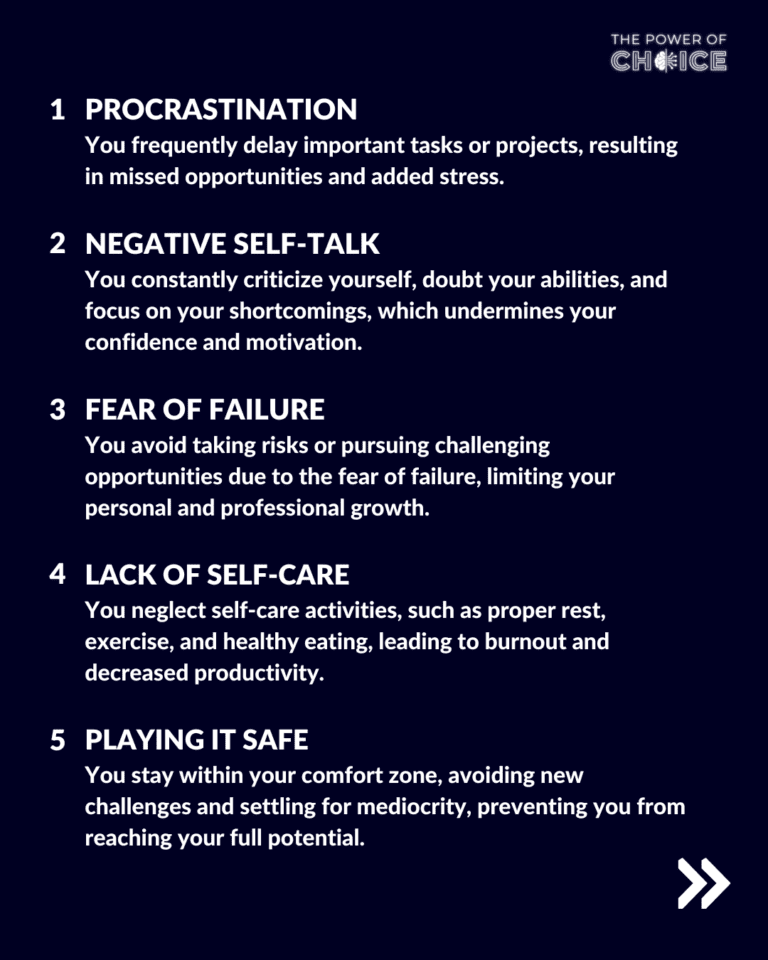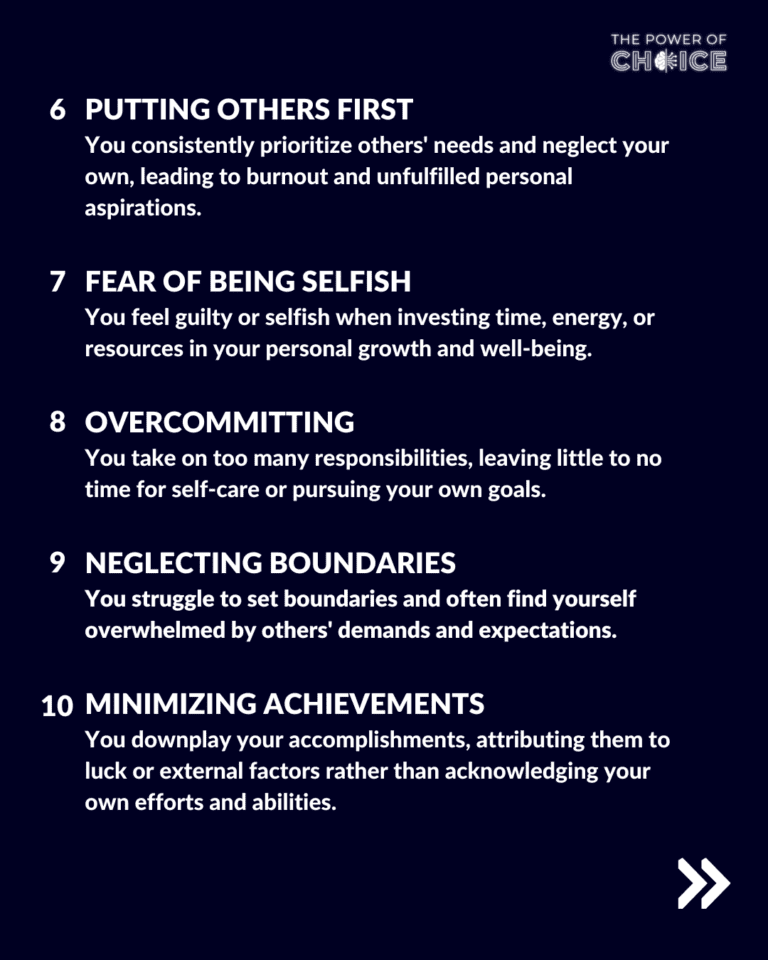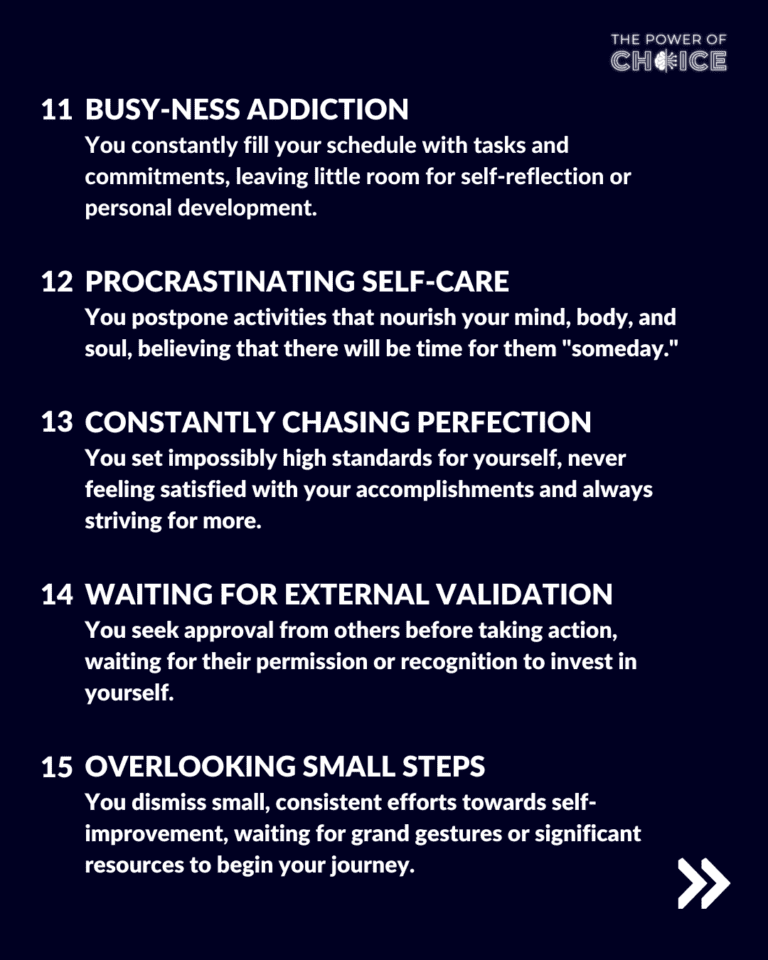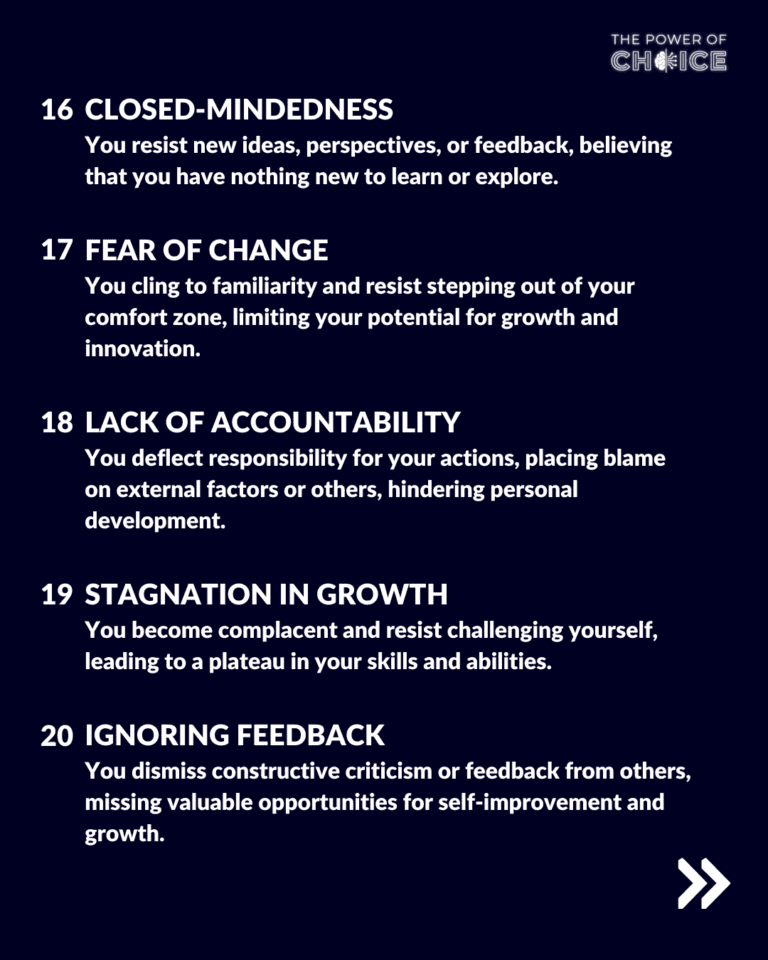Is it time to stop Self-Sabotaging yourself at Work?
Leveraging your fair advantage is a transformative journey that requires commitment, effort, and self-awareness. It’s not always an easy path, as self-sabotaging thoughts and behaviors can hinder your progress. Let’s explore the challenges professionals face in their pursuit of success and provide practical strategies to overcome self-sabotage and unlock your fair advantage.
The Instant Gratification Trap
In our fast-paced society, we are wired to seek instant gratification. We crave immediate results and often overlook the long-term gains. However, leveraging your fair advantage is a process, not an event. There are no shortcuts or quick fixes to success. Instead, it requires consistent effort, patience, and a focus on the bigger picture. Embrace the journey and commit to continuous growth and improvement.
Confronting Self-Doubt and Insecurities
Self-doubt and insecurities can be significant obstacles on the path to success. Even highly knowledgeable and skilled professionals may struggle to see themselves in a positive light. They get discouraged, second-guess themselves, and procrastinate on important tasks. It’s crucial to recognize that your perceived weaknesses may actually be your greatest strengths. Embrace your unique qualities, skills, and experiences, and leverage them to differentiate yourself in the marketplace.
Prioritizing Self-Investment
In our selfless pursuit of serving others, we often neglect our own needs and desires. However, investing in yourself is not selfish; it is essential for personal and professional growth. Prioritize self-care, continuous learning, and skill development. Set aside dedicated time and resources to invest in your well-being, education, and professional development. Remember, by investing in yourself, you enhance your ability to contribute positively to others and achieve long-term success.
Escaping the Perfectionism Trap
Perfectionism can be paralyzing and hinder progress. Many professionals believe they must be perfect before taking action or pursuing their goals. However, perfection is an unrealistic expectation. Embrace the idea that growth and improvement are ongoing processes. Focus on taking consistent steps forward, even if they are small. Embrace imperfections as opportunities for learning and growth. Embrace a mindset of progress, not perfection.
The Inside Job
Self-sabotage often stems from our own thoughts and behaviors. Unconsciously, we engage in destructive habits that undermine our success. To overcome self-sabotage, it’s crucial to develop self-awareness. Take the time to identify your triggers and patterns. Challenge self-defeating thoughts and replace them with empowering beliefs. Take control of your reactions and consciously choose behaviors that align with your goals. Seek support from mentors, coaches, or therapists who can provide guidance and help you navigate through self-sabotaging tendencies.
20 Signs that you are self-sabotaging
- Procrastination: You frequently delay important tasks or projects, resulting in missed opportunities and added stress.
- Negative Self-Talk: You constantly criticize yourself, doubt your abilities, and focus on your shortcomings, which undermines your confidence and motivation.
- Fear of Failure: You avoid taking risks or pursuing challenging opportunities due to the fear of failure, limiting your personal and professional growth.
- Lack of Self-Care: You neglect self-care activities, such as proper rest, exercise, and healthy eating, leading to burnout and decreased productivity.
- Playing it Safe: You stay within your comfort zone, avoiding new challenges and settling for mediocrity, preventing you from reaching your full potential.
- Putting Others First: You consistently prioritize others’ needs and neglect your own, leading to burnout and unfulfilled personal aspirations.
- Fear of Being Selfish: You feel guilty or selfish when investing time, energy, or resources in your personal growth and well-being.
- Overcommitting: You take on too many responsibilities, leaving little to no time for self-care or pursuing your own goals.
- Neglecting Boundaries: You struggle to set boundaries and often find yourself overwhelmed by others’ demands and expectations.
- Minimizing Achievements: You downplay your accomplishments, attributing them to luck or external factors rather than acknowledging your own efforts and abilities.
- Busy-ness Addiction: You constantly fill your schedule with tasks and commitments, leaving little room for self-reflection or personal development.
- Procrastinating Self-Care: You postpone activities that nourish your mind, body, and soul, believing that there will be time for them “someday.”
- Constantly Chasing Perfection: You set impossibly high standards for yourself, never feeling satisfied with your accomplishments and always striving for more.
- Waiting for External Validation: You seek approval from others before taking action, waiting for their permission or recognition to invest in yourself.
- Overlooking Small Steps: You dismiss small, consistent efforts towards self-improvement, waiting for grand gestures or significant resources to begin your journey.
- Closed-mindedness: You resist new ideas, perspectives, or feedback, believing that you have nothing new to learn or explore.
- Fear of Change: You cling to familiarity and resist stepping out of your comfort zone, limiting your potential for growth and innovation.
- Lack of Accountability: You deflect responsibility for your actions, placing blame on external factors or others, hindering personal development.
- Stagnation in Growth: You become complacent and resist challenging yourself, leading to a plateau in your skills and abilities.
- Ignoring Feedback: You dismiss constructive criticism or feedback from others, missing valuable opportunities for self-improvement and growth.
It’s important to recognize these self-sabotaging patterns and address them head-on. Overcoming self-sabotage requires self-awareness, a commitment to personal growth, and the willingness to challenge limiting beliefs. By taking control of your mindset, prioritizing self-care, and embracing a growth mindset, you can unlock your fair advantage and achieve long-term success.
The journey to leveraging your fair advantage may be challenging, but it’s well worth the effort. Don’t let self-sabotage hold you back from reaching your full potential. Identify the signs, confront them, and take proactive steps towards personal and professional growth. Remember, you have the power to transform your career and create a future filled with success and fulfillment.
Ready to overcome self-sabotage and unlock your fair advantage? Dive deeper into these strategies and insights by exploring the transformative content of the book “Discover Your Fair Advantage.” It’s time to embrace your uniqueness, thrive in your professional life, and achieve the success you deserve.
20 SIGNS OF SELF-SABOTAGE IN A NUTSHELL






PD: ¿Le interesan más contenidos como éste? No deje de visitar sígueme en Instagram. Es donde visualizo y publico mis pensamientos diariamente. Espero verte por allí.




